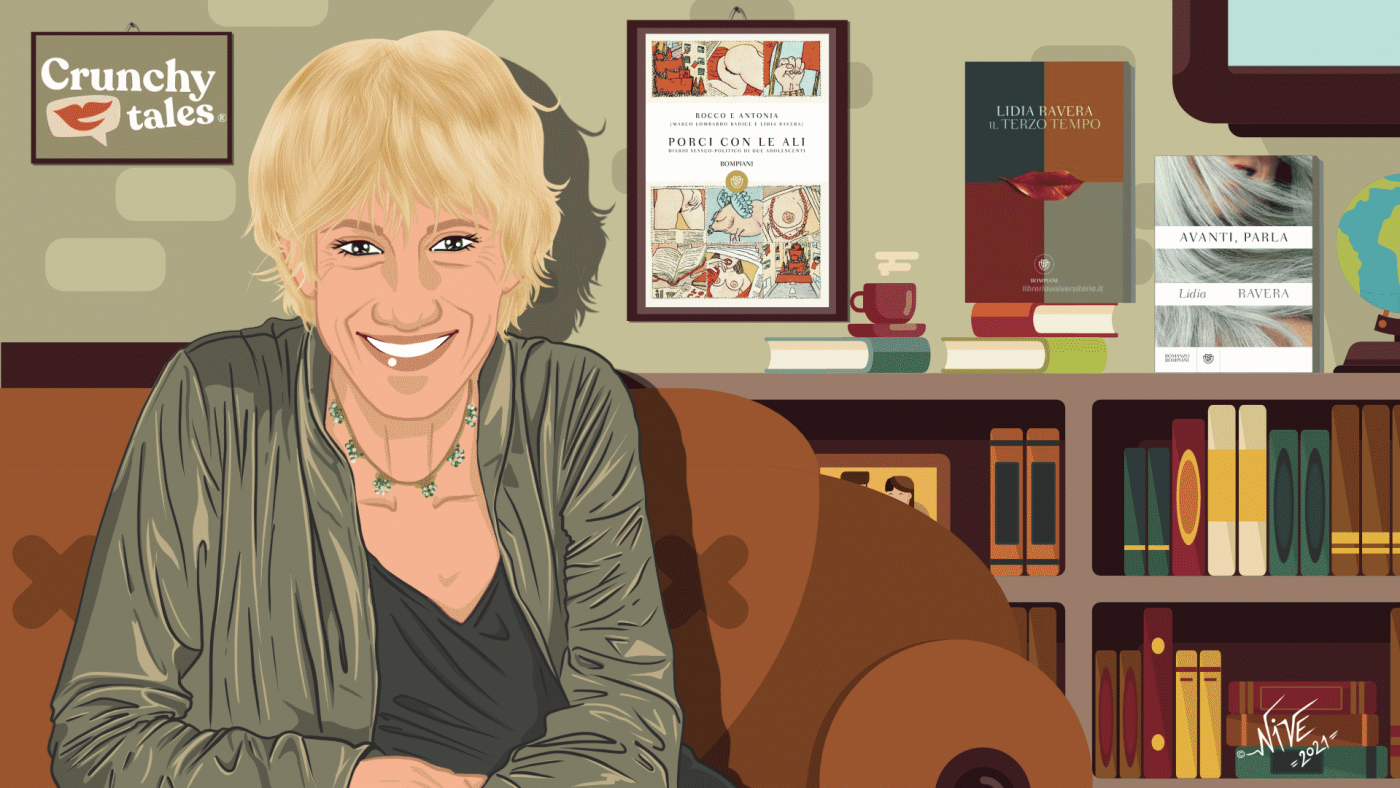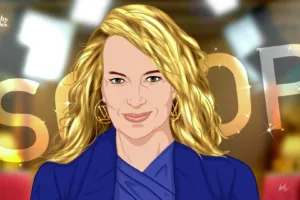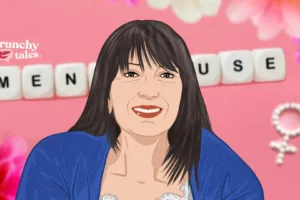Feminist Lidia Ravera: “I Dream Of An Ageless Society Where Generations Can All Mix And Mingle”
Behind her inquisitive eyes, you will find a woman who has never given up. Since 1968, Italian feminist writer, screen player and journalist Lidia Ravera has been using language to expose the cultural and psychological nature of the oppression of women, fighting the patriarchy.
After becoming popular with her first novel ‘Porci Con Le Ali‘ (Pigs With Wings), which dealt with the disillusionment of her generation with the ideals of the late 1960s, she has published more than 30 books. Now, she is changing the narrative around ageing with top-notch editorial series dedicated to women over 60 called “Terzo Tempo” (to be released next February by Harper Collins).
Lidia, you have fought many battles. The latest of these, breaking down age-related stereotypes, is pretty complicated, especially for women. Is there a way to change the tide?
It’s a daily battle. People like me, who handle words well, may challenge it by writing novels, but you can do that in your daily life, too. We must not blush and bow our heads because of our age, instead, we should teach the world that everyone grows older in their own way and that old age is like soft clay that people can model to suit themselves and therefore all those ideas around ageing, often taken for granted, must be rebuked.
Lidia, you’ve been wondering about the passage of time and the fear of getting old since you were 15. Did you ever find an answer?
No, not really. Because there is no answer. We only have one life. We are born, we grow, we mature, then we age and die. What might console us is that ageing is a collective condition and that is what allows us to interact with different generations. Because you see, we may be more or less distant from the beginning or end of our life but we are all mortal. By being aware of this, a genuine exchange of ideas, words, and feelings between people of different ages can begin.
The leading characters of your latest books are all very ‘Crunchy’. Over 60, they know how to smile at some frustration, sometimes they are courageous, others have a cumbersome past. But all of them have an extra gear. Knowing how to take risks, getting back into the game again; could these be the levers on whom to focus on to avoid oblivion and regain possession of the spaces that after a certain age someone would like to take away from us?
The leading characters of my books are mainly women who do not tell lies to themselves. For me personally, that’s the key to a dignified, useful and even beautiful way of ageing. We, women, should look at things the way they really are without being too self-indulgent about ourselves. We need to be more regimented with ourselves as well as be strong enough and capable of giving back as good as we get. Unfortunately, when we stop learning we begin to die, that’s why we must always learn. This does not mean continuing to study but being curious about the world, forming an opinion, questioning it, even changing it. In short, we should always be intellectually active. And this usually comes naturally for women.
Women are more complex and complete human beings than men because they have a unique relationship with nature and their bodies, a great privilege. It’s a privilege because that prevents you from omnipotence, one of the most serious problems of men, especially when they get old. Men are afraid of their fragility and that’s why they try to distract themselves with new activities or expensive toys or revive their youth by going out with younger women. They do not accept suffering as a passage of life. A passage which indeed once completed propels us towards the sublime, towards a phase of existence where you no longer have to deal with this stupidity all of the time. Why? Because you always think. And I find this very exciting. A continuous form of re-evaluation and redevelopment that only women do because we suffer more. Men suffer less and tend to understand less.
You are the creator of a book series dedicated to baby boomers called “Terzo Tempo”. Romance novels in which ladies over 60 can recognize themselves and maybe dream. In fact, today’s women have changed a lot, I would say we have become more emancipated and compared to our grandmothers; we do not hide hopes, impulses and desires. Can you tell us more about that?
I’ve created this book series called ‘Terzo Tempo” especially for women over 60. Starting from February 2022, two novels published by Harper Collins will be released in Italy every two months. This way, I wanted to reach a broader audience via bookstores as well as newsstands. In my books, you will find love, desire but especially lots of irony because I think it’s one of the ways women can reduce the damage of a male-dominated society. A great defense.
I would also consider this project a political gesture against stereotypes because especially those about ageing are very hard to kill. I do politics with my books, without pedagogy, using writing to share the results I’ve come up with in my journey. One of these achievements is having less fear about ageing.
We often hear people say: age is just a number. However, some American activists argue that numbers really do matter in this case in terms of experience, wisdom, self-confidence. Our age is a privilege and an achievement to be proud of. What do you think about that?
I am proud of my age because I am proud of how I’ve got there both physically and mentally. There is no merit in being young, it’s a transitory and common condition. To be old there is instead something to be proud of because life is flowing against you and if you get there without surrendering yourself to fear, hypochondria, anxiety and laziness, then you can be very impressed with yourself. I am 70 and whenever I feel I’m withdrawing from life then I scold myself.
You know, I’ve been challenging ageing stereotypes for more than 25 years now. When I was 40, I came up with an editorial project called ‘Zenith‘, a magazine for midlife women, but even though publishers liked it a lot they weren’t fully convinced. One of them told me that women wouldn’t appreciate that because they do not want to see themselves as someone who is over 40 years old. That’s when my battle began.
I realised there was such a big job to do because the contempt for women is very strong when they are no longer considered as sexual objects. Unfortunately, things haven’t changed that much, but I’ll keep fighting against ageing stereotypes anyway with my new series of books.
Meantime, I’ve raised the bar. I don’t just want women to have the right to grow old with pride and without having to suffer those ageist clichés typical of our culture. I want a society where age is not a barrier; I dream of an ageless society where all generations can mix and mingle. It would be wonderful, wouldn’t it? Think of mutual support, exponential growth and empathy. Because, you know, if you only hang out with women of the same age, you might remain reassured in your little comfort zone but you will not be able to take a step towards what I call the full awareness of an existential journey. Think about it: for young people, that would be a preparation for a phase of life that is not easy if you arrive unprepared and for those who are approaching the end it would be retracing other life-seasons and also a chance to pass on their experience giving your life sense and meaning. That would mean having a society in which no one would be afraid of getting old.
We often hear about successful ageing. Obviously, a dynamic lifestyle and good health help to make the most of age. But for those women who do not have the opportunity to travel, experiment, meet new people, this phase of life is not always so rosy. Many women complain of a lack of stimulation and meaning. How can we continue to give our life momentum?
Women shouldn’t feel like they’re disappearing just because men don’t look at them anymore and I think they shouldn’t have ‘Barbie touch-ups’ because, in my opinion, they’d have the word “Defeat” written on their face. I hope my book series will be translated soon because they’ve been created to speak to every woman and because they might help them to re-evaluate themselves. The real problem with women of a certain age is that they have introjected negative stereotypes that make them feel no longer an object of desire, so not worthy of attention. If they would only look at themselves with kind eyes, then they will be able to be seen by others with different eyes, too. Often we choose to be in the shadow because we think we no longer have a right to the limelight.
My novels work on this. The characters of my books are real 60-years-old women who all have the problems of shame and inadequacy that they might have when they no longer correspond to the canonical age for love, so they deny it to themselves. If you are the first to deny love to yourself then nothing will happen. Women from my books are realistic; they are stuck in a story where dreams win. By writing about them I feel I can get close to my audience. But I think I’ve become even closer to them via my ‘Senior Cafés’, meetings for women over 60, led by me, in which we talk about what it means to grow old in a sexist and male chauvinist society like ours.
The Italian Nobel Prize Winner for Medicine, Rita Levi Montalcini, argued that women who changed the world never needed to show anything, only their intelligence. In some interviews, you said that you have always preferred to shake your brain rather than your behind. Could this be the elixir of eternal youth?
I often work with schools helping young women to work on self-awareness. I always tell girls to learn to shake their brain rather than their behind because the first one will last. You see, the more you use it, the more it lasts. It’s a muscle, you exercise it and you can keep going on until your death bed. You never know: at 95 you can say something terribly witty that cheers onlookers. If you use your brain, then you will have no limits. The body suffers wear and tear over time, we can’t do so much about that. Chasing your youth is absurd and a lost cause. Instead, keep thinking and reading. In books, you will find the intelligence of others. And you know, you don’t necessarily have to be an intellectual because you can spin your brain even if you are in fifth grade.
Continuing to nurture your intelligence is what will give you the strength to handle the reality of life. Then, one day you will not have to apologize for not being 20 as if it was a fault rather than a fact. Always keep in mind that the only way not to grow old is to die young, this is something that is trivial but must be continually remembered. Life is a responsibility: if you want to live you have to take on this whole responsibility.
Is there still something that amazes you?
Yes, the very first three years of life. It’s when a brand new human changes daily and that is an extraordinary experience to see. I didn’t fully enjoy it when I was a mom, at least not enough. These days, maybe because I’m now a grandmother I tend to make the most of my grandchildren. You see, I am fascinated by the beginning of life and the end of it. Both still amaze me. I also believe that wonder and amazement are a result of paying more attention to things around us. The more carefully you observe, the more easily you can find something that surprises you. And just as it is for kids, we shouldn’t be afraid of repetition.
Children usually throw their toys because repetition is a type of rhythm and growth for them. It’s the rhythm of life. We are afraid of repetition because we think that we need to build up experiences horizontally, but no, I think we have to go deeper. Through repetition you will be able to do that, then you will always find new ways to be amazed.
Like this post? Support Us or Sign up to our newsletter to get more articles like this delivered straight to your inbox!





